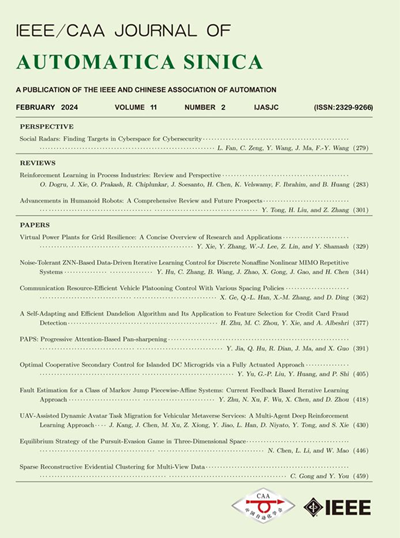A State-Migration Particle Swarm Optimizer for Adaptive Latent Factor Analysis of High-Dimensional and Incomplete Data
IF 19.2
1区 计算机科学
Q1 AUTOMATION & CONTROL SYSTEMS
引用次数: 0
Abstract
High-dimensional and incomplete (HDI) matrices are primarily generated in all kinds of big-data-related practical applications. A latent factor analysis (LFA) model is capable of conducting efficient representation learning to an HDI matrix, whose hyper-parameter adaptation can be implemented through a particle swarm optimizer (PSO) to meet scalable requirements. However, conventional PSO is limited by its premature issues, which leads to the accuracy loss of a resultant LFA model. To address this thorny issue, this study merges the information of each particle's state migration into its evolution process following the principle of a generalized momentum method for improving its search ability, thereby building a state-migration particle swarm optimizer (SPSO), whose theoretical convergence is rigorously proved in this study. It is then incorporated into an LFA model for implementing efficient hyper-parameter adaptation without accuracy loss. Experiments on six HDI matrices indicate that an SPSO-incorporated LFA model outperforms state-of-the-art LFA models in terms of prediction accuracy for missing data of an HDI matrix with competitive computational efficiency. Hence, SPSO's use ensures efficient and reliable hyper-parameter adaptation in an LFA model, thus ensuring practicality and accurate representation learning for HDI matrices.用于高维不完整数据自适应潜因分析的状态迁移粒子群优化器
高维不完整(HDI)矩阵主要产生于各种与大数据相关的实际应用中。潜在因素分析(LFA)模型能够对 HDI 矩阵进行有效的表征学习,其超参数适应可以通过粒子群优化器(PSO)来实现,以满足可扩展的要求。然而,传统的 PSO 受限于其不成熟的问题,导致生成的 LFA 模型精度下降。为了解决这个棘手的问题,本研究根据广义动量法的原理,将每个粒子的状态迁移信息融合到粒子群的进化过程中,以提高粒子群的搜索能力,从而建立了状态迁移粒子群优化器(SPSO)。然后将其纳入 LFA 模型,在不损失精度的情况下实现高效的超参数适应。对六个人类发展指数矩阵的实验表明,就人类发展指数矩阵缺失数据的预测准确性而言,SPSO-incorporated LFA 模型优于最先进的 LFA 模型,且计算效率极具竞争力。因此,SPSO 的使用确保了 LFA 模型中超参数适应的高效性和可靠性,从而保证了 HDI 矩阵的实用性和准确表示学习。
本文章由计算机程序翻译,如有差异,请以英文原文为准。
求助全文
约1分钟内获得全文
求助全文
来源期刊

Ieee-Caa Journal of Automatica Sinica
Engineering-Control and Systems Engineering
CiteScore
23.50
自引率
11.00%
发文量
880
期刊介绍:
The IEEE/CAA Journal of Automatica Sinica is a reputable journal that publishes high-quality papers in English on original theoretical/experimental research and development in the field of automation. The journal covers a wide range of topics including automatic control, artificial intelligence and intelligent control, systems theory and engineering, pattern recognition and intelligent systems, automation engineering and applications, information processing and information systems, network-based automation, robotics, sensing and measurement, and navigation, guidance, and control.
Additionally, the journal is abstracted/indexed in several prominent databases including SCIE (Science Citation Index Expanded), EI (Engineering Index), Inspec, Scopus, SCImago, DBLP, CNKI (China National Knowledge Infrastructure), CSCD (Chinese Science Citation Database), and IEEE Xplore.
 求助内容:
求助内容: 应助结果提醒方式:
应助结果提醒方式:


